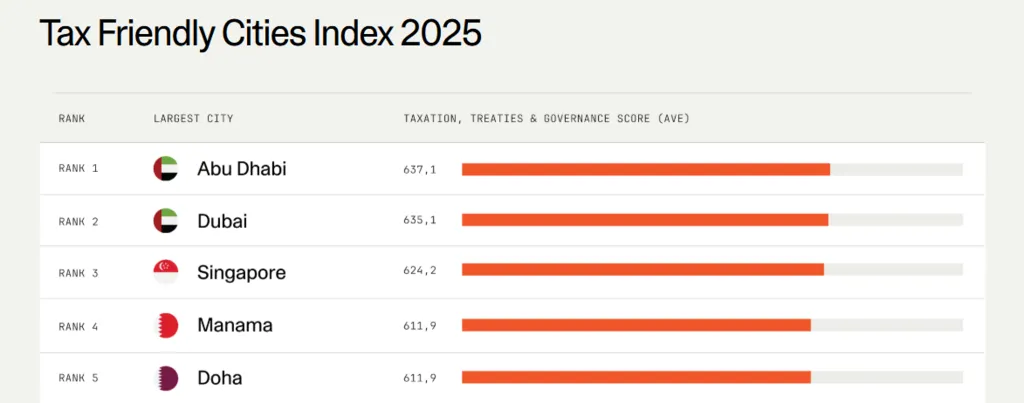Abu Dhabi Tax Score of 637.1 Secures Global Top Spot
In 2025, Abu Dhabi has officially claimed the title of the world’s most tax-friendly city, scoring an impressive 637.1 on Multipolitan’s Tax Friendly Cities Index. This composite score reflects a blend of zero personal income tax, low property transfer fees, and robust legal infrastructure—making Abu Dhabi not just a fiscal haven, but a strategic base for global wealth preservation.
MENA’s Top Tax-Friendly Cities Ranked in the Top 20 of Multipolitan’s Tax Friendly Cities Index 2025:
# | Cities | Score |
1 | Abu Dhabi | 637.1 |
2 | Dubai | 635.1 |
4 | Manama | 611.9 |
5 | Doha | 611.9* |
8 | Kuwait City | 590.5 |
12 | Riyadh | 582.9 |
17 | Muscat | 575.9 |
*(Manama ranks higher than Doha based on the unrounded figures)
Zero Income Tax + Legal Stability = Investor Magnet
The cornerstone of Abu Dhabi’s tax appeal lies in its 0% personal income tax regime. But what truly sets it apart is the consistency and predictability of its governance. Investors and globally mobile families are increasingly prioritizing jurisdictions that offer not just low tax rates, but assurance that those rates won’t shift overnight. Abu Dhabi’s legal clarity and regulatory stability provide exactly that, making it a magnet for high-net-worth individuals (HNWIs) seeking long-term security.
9,800 Millionaires Moving to UAE in 2025
The UAE’s tax-friendly reputation is translating into real migration. In 2025 alone, 9,800 millionaires are expected to relocate to the country, bringing with them an estimated $63 billion in wealth. Abu Dhabi, as the top-ranked city, is poised to capture a significant share of this influx. The city’s tax ecosystem is no longer just a regional advantage—it’s a global draw.
Treaty Network + Property Efficiency Boost Abu Dhabi Tax Score
Abu Dhabi’s high score also reflects its international treaty coverage and efficient property-related costs. Compared to Dubai, which ranks second with a score of 635.1, Abu Dhabi edges ahead due to slightly lower property transfer fees and a more streamlined legal framework. These marginal gains compound into meaningful advantages for investors structuring cross-border assets.

Beyond Tax: Abu Dhabi’s Rise in Wealth Preservation & Sustainability
While Abu Dhabi leads in tax friendliness, its performance in other indices signals growing maturity. It ranks 22nd in the Wealth Preservation Cities Index, reflecting its progress in safeguarding purchasing power amid global volatility. On the Smart & Sustainable Cities Index, Abu Dhabi places 23rd, showing momentum in climate resilience and digital infrastructure—key pillars for future-proofing wealth.
Abu Dhabi Corporate Tax FAQs: What Investors and Businesses Ask Most
To round out Abu Dhabi’s position as the world’s top tax-friendly city, here are answers to the most frequently asked questions about its corporate tax regime:
Q1: Is there corporate tax in Abu Dhabi?
Yes. As of June 2023, the UAE—including Abu Dhabi—introduced a federal corporate tax 9% on taxable income exceeding AED 375,000. Income below this threshold is taxed at 0%, making it one of the most competitive corporate tax regimes globally.
Q2: Are free zone companies taxed in Abu Dhabi?
Free zone entities may still benefit from a 0% tax rate on qualifying income, provided they meet substance requirements and maintain proper documentation. Non-qualifying income is taxed at the standard 9% rate, though local reliefs or carve-outs may still apply.
Q3: How does Abu Dhabi Tax compare globally?
Despite the introduction of a 9% corporate tax on taxable income exceeding AED 375,000, Abu Dhabi’s rate remains among the lowest globally. Combined with its zero personal income tax, legal clarity, and treaty coverage, it continues to offer a highly attractive fiscal environment for both startups and multinational firms
(*)This article is for informational purposes only and should not be relied upon as legal, tax, or financial advice. For jurisdiction-specific guidance, please contact our advisory team directly.
Also Read: The Future of Wealth: Abu Dhabi’s Financial Expansion







